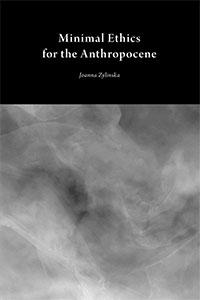
Minimal Ethics for the Anthropocene. Cover.
Minimal Ethics for the Anthropocene. Cover.
© 2014 Joanna Zylinska
 This work is licensed under a Creative Commons Attribution-ShareAlike 4.0 International License.
This work is licensed under a Creative Commons Attribution-ShareAlike 4.0 International License.
Zylinska, Joanna. Minimal Ethics for the Anthropocene. London: Open Humanities Press, 2014.
Life typically becomes an object of reflection when it is seen to be under threat. In particular, humans have a tendency to engage in thinking about life (instead of just continuing to live it) when being confronted with the prospect of death: be it the death of individuals due to illness, accident or old age; the death of whole ethnic or national groups in wars and other forms of armed conflict; but also of whole populations, be they human or nonhuman. Even though Minimal Ethics for the Anthropocene is first and foremost concerned with life—understood as both a biological and social phenomenon—it is the narrative about the impending death of the human population (i.e., about the extinction of the human species), that provides a context for its argument. “Anthropocene” names a geo-historical period in which humans are said to have become the biggest threat to life on earth. However, rather than as a scientific descriptor, the term serves here primarily as an ethical injunction to think critically about human and nonhuman agency in the universe.
Restrained in tone yet ambitious in scope, the book takes some steps towards outlining a minimal ethics thought on a universal scale. The task of such minimal ethics is to consider how humans can assume responsibility for various occurrences in the universe, across different scales, and how they can respond to the tangled mesh of connections and relations unfolding in it. Its goal is not so much to tell us how to live but rather to allow us to rethink “life” and what we can do with it, in whatever time we have left. The book embraces a speculative mode of thinking that is more akin to the artist’s method; it also includes a photographic project by the author. (Text from Open Humanities Press)
© Joanna Zylinska, 2014. This book is licensed CC BY-SA 4.0.
The Critical Climate Change series addresses the current sense of depletion, decay, mutation, and exhaustion which calls for new modes of address, new styles of publishing and authoring, and new formats and speeds of distribution. Edited by Tom Cohen and Claire Colebrook, the series aims to publish, in a timely fashion, experimental monographs that redefine the boundaries of disciplinary fields, rhetorical invasions, the interface of conceptual and scientific languages, and geomorphic and geopolitical interventions.

